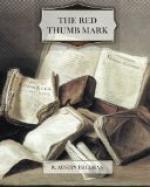“That was what I thought,” replied Mrs. Hornby, “but Walter tells me that it was not so, and, of course, he would remember better than I should.”
“But, my dear aunt, I am sure he gave it to you,” interposed Juliet. “Don’t you remember? It was the night the Colleys came to dinner, and we were so hard pressed to find amusement for them, when Walter came in and produced the ‘Thumbograph.’”
“Yes, I remember quite well now,” said Mrs. Hornby. “How fortunate that you reminded me. We must alter that answer at once.”
“If I were you, Mrs. Hornby,” I said, “I would disregard this paper altogether. It will only confuse you and get you into difficulties. Answer the questions that are put, as well as you can, and if you don’t remember, say so.”
“Yes, that will be much the wisest plan,” said Juliet. “Let Dr. Jervis take charge of the paper and rely on your own memory.” “Very well, my dear,” replied Mrs. Hornby, “I will do what you think best, and you can keep the paper, Dr. Jervis, or throw it away.”
I slipped the document into my pocket without remark, and we proceeded on our way, Mrs. Hornby babbling inconsequently, with occasional outbursts of emotion, and Juliet silent and abstracted. I struggled to concentrate my attention on the elder lady’s conversation, but my thoughts continually reverted to the paper in my pocket, and the startling solution that it seemed to offer of the mystery of the poisoned cigar.
Could it be that Walter Hornby was in reality the miscreant X? The thing seemed incredible, for, hitherto, no shadow of suspicion had appeared to fall on him. And yet there was no denying that his description tallied in a very remarkable manner with that of the hypothetical X. He was a man of some means and social position; he was a man of considerable knowledge and mechanical skill, though as to his ingenuity I could not judge. He had recently bought a second-hand Blickensderfer which probably had a literary typewheel, since it was purchased from a literary man; and that machine showed the characteristic mark on the small “e.” The two remaining points, indeed, were not so clear. Obviously I could form no opinion as to whether or not Thorndyke held any exclusive information concerning him, and, with reference to his knowledge of my friend’s habits, I was at first inclined to be doubtful until I suddenly recalled, with a pang of remorse and self-accusation, the various details that I had communicated to Juliet and that she might easily, in all innocence, have handed on to Walter. I had, for instance, told her of Thorndyke’s preference for the Trichinopoly cheroot, and of this she might very naturally have spoken to Walter, who possessed a supply of them. Again, with regard to the time of our arrival at King’s Cross, I had informed her of this in a letter which was in no way confidential, and again there was no reason why the information should not have been passed on to Walter, who was to have been one of the party at the family dinner. The coincidence seemed complete enough, in all truth; yet it was incredible that Reuben’s cousin could be so blackhearted a villain or could have any motive for these dastardly crimes.




